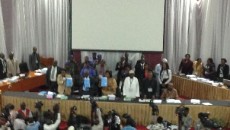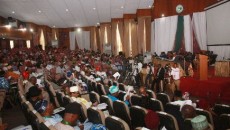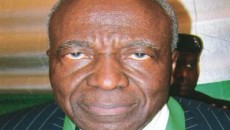Canvassed solutions to end insurgency in Nigeria
The abduction of about 100 girls of a secondary school in Chibok, Borno State by some unknown persons dominated the plenary session of the ongoing National Conference with many delegate demanding drastic actions to contain the security challenges confronting the nation.
Some of the delegate decried the alleged politicization of the security challenges by the two main political parties in Nigeria, the Peoples Democratic Party, PDP, and the All Progressives Congress, APC, and the decision of the former to go ahead with its rally in Kano while the nation’s young citizens were being held by abductors.
The school girls, aged between 9 and 12, were allegedly abducted by unknown armed bandits who drove in a convoy of trucks and buses, invaded the school compound, carted away goods from the stores and carried the girls away.
Discussion on the issue began when the Deputy Chairman of the Conference, Bolaji Akinyemi told the delegates that the leadership had just received news of the abduction of the 100 female students of the Government Secondary School, Chibok, Borno State.
A former Women Affairs Minister and a delegate from Kano State, Aisha Ismail said all the female delegates at the Conference were dressed in black attire as a sign of mourning of the people killed by insurgents.
While appealing to the delegates to show concern, Ms. Ismail painted a gory picture of the incident, saying the only “crime” of the innocent children was that they agreed to be educated.
In his contribution, a clergyman and delegate from the South West zone, said the Conference should send a strong signal on the matter and other security issues by shutting down its proceedings as a show of solidarity with the victims of insurgent activities.
“It is a state of war. Politicians must take politics entirely out of this issue. There are external sponsors who must be identified,” he said.
Another delegate, Annkio Briggs said: “I speak as a mother, I speak as a woman, I speak as a Nigerian. What is happening in Nigeria happens because of what some people whether inside or outside have decided will happen.”
Ms. Briggs said although one part of Nigeria was principally affected by the acts of terror, it was almost uncertain if the killings and bombing could still be contained any longer.
She stated that it was time for Nigerians to come together and decide on what was best for the country because “this is no longer about politics, it is about the security of the country.”
A former governor of Ogun State, Segun Osoba suggested the closing down of the Nigeria’s borders with Cameroon, Chad and Niger Republic if the insurgent activities must be stopped.
Mr. Osoba also said the Conference secretariat should lead a delegation to President Goodluck Jonathan to convey the views the delegates canvassed on the security matters.
A Civil Society delegate, Ezenwa Nwagwu regretted that while other delegates were saying that security matters should be divorced from politics, “a political party is holding a rally in Kano.”
He stressed, I hear some people saying we should send a delegation to this man (jonathan) who asked us to help him.”
Ledum Mitee, a Federal Government delegate, said at a time like this, dirty political mudslinging and blame-sharing must give way to decent reasoning among political leaders towards finding solutions to the problem.
He said the Conference should take advantage of the human resources available by asking each of the 20 Standing Committees to come up with their suggestion on how to tackle the security challenges.
“This is not the time to grandstand,” he cautioned, “we may have elders but at a time like this, we need statesmen who should rise up and lead the nation out of this mess. This is no time for politics.”
Fati Ibrahim, said the Conference must look beyond expression of sympathy and the national mourning and take practical steps to ensure that the girls who have been abducted were returned in good condition.
Ramatu Usman demanded to know if there were no elders in the communities whose citizens have been subjected to suffering and death, adding that as people who are respected by everyone, the elders should be able to identify those behind and those actually perpetrating the ugly development.
According to her, “if it were possible to identify the people behind the dreaded Maitasine sect in the past, if it were possible to identify aggrieved youths of the Niger Delta and brought the situation under control, if it were possible to identity the OPC members in the west, then why can’t Boko Haram members be identified?”



